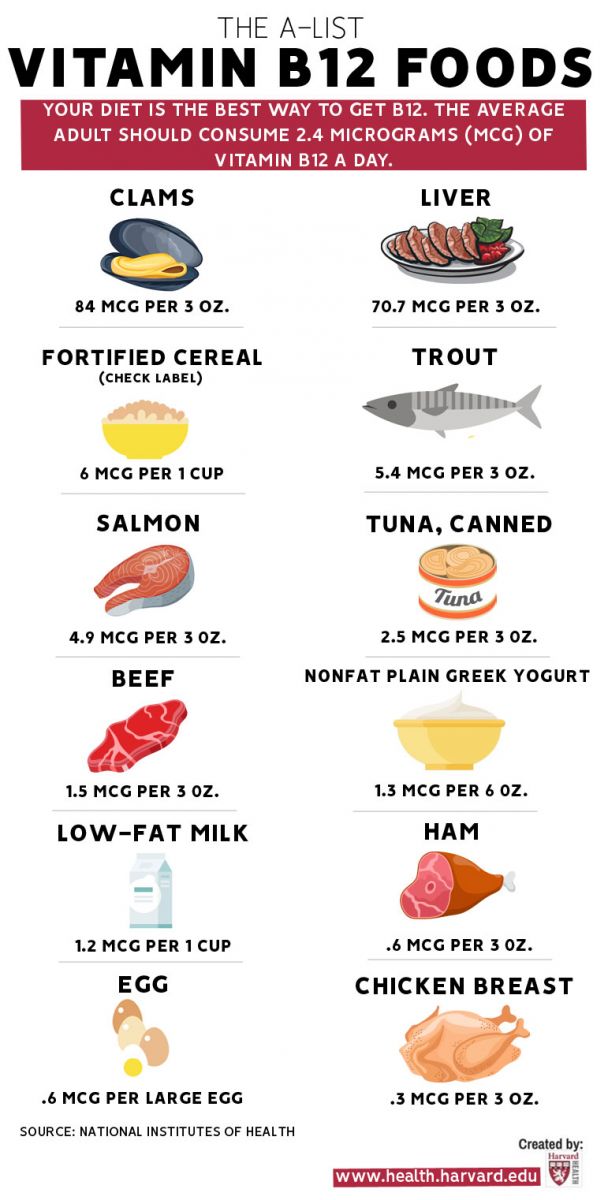Vitamin B12 is a water-soluble vitamin essential for the overall functioning of the body. It is naturally found in animal products such as fish, meat, and dairy and is also in fortified products like bread and plant based-milk.
Often taken in combination with other B vitamins, B12 plays an essential role in the proper functioning of the nervous system as well as in the production of red blood cells, DNA, and myelin (the insulation around brain cells). B12 deficiency is common and can be caused by malabsorption or by dietary insufficiency. Populations at increased risk for deficiency include individuals with GI problems, vegetarians, the elderly, and those who have had surgery to remove the part of the bowel that absorbs B12. Research has indicated that symptoms of a vitamin B12 deficiency can take years to manifest and that it is commonly mistaken for a folate (vitamin B9) deficiency.
Symptoms of vitamin B12 deficiency may include:
Weakness and fatigue
Pale skin
Mouth ulcers
Dizziness
A variety of neuropsychiatric symptoms
Disturbed vision
Now that we have discussed some of the basics of vitamin B12 deficiency, let’s look at its importance in the overall functioning of the body.
THE ROLE OF VITAMIN B12
1. Helps with the formation of red blood cells and the prevention of anemia
B12 plays a vital role in helping your body produce red blood cells which are important in carrying oxygen from the lungs to the body tissues. Low intake of B12 causes a reduction in hemoglobin formation and prevents red blood cells from developing properly. A deficiency causes the red blood cells to become larger and oval instead of the typical small, round shape. The irregular shape of the red blood cell prevents it from moving from the bone marrow into the bloodstream at the normal rate, causing anemia.
2. Reduces the risk of age-related macular degeneration
Age-related macular degeneration is a disease of the eyes that results in blurred vision or loss of vision. Macular degeneration affects an estimated 10 million people, more than glaucoma and cataracts combined. The good new is that maintaining sufficient levels of vitamin B12 can help to prevent macular degeneration. A randomized trial of women over the age of 40 concluded that vitamin B12 supplemented with folic acid and vitamin B6 may help to reduce the risk of age-related macular degeneration.
3. Improves mood
Optimizing your levels of vitamin B12 may result in significant mood improvement. B12 is involved in the synthesis and metabolism of serotonin, a neurotransmitter responsible for mood regulation in the body. A deficiency in Vitamin B12, therefore, may lead to a decrease in the production of serotonin which can lead to depression or other mood-related disorders. A 2013 study of people with depression found that those who received both vitamin B12 and an antidepressant were more likely to show an improvement in their mood compared to those who used an antidepressant alone. Studies like this are promising but more research is needed to fully understand the role of Vitamin B12 in mood related disorders and how we can incorporate supplementation in treatment plans.
4. Reduces the risk of birth defects
Adequate vitamin B12 levels are important for everyone, but especially women who are pregnant or trying to become pregnant. During the early stages of pregnancy, vitamin B12 deficiency may increase the risk of neural tube defects in the fetus, a condition which could affect the brain, spine, and/or spinal cord. Studies have indicated that proper development of the baby’s brain and nervous system requires sufficient B12 levels. The research went further and indicated that women with insufficient B12 intake were three times more likely to give birth to a child with birth defects compared to those with adequate intake.
WHO IS AT RISK OF DEFICIENCY?
As mentioned above, Vitamin B12 deficiency stems from one of two causes--either you are not consuming adequate amounts of B12 through your diet or your body is unable to fully absorb it from what you do consume.
Those at risk of vitamin B12 deficiency include:
Older adults, over age 50
People with gastrointestinal disorders, such as Crohn’s disease or celiac disease
People on a strict vegan diet and some vegetarian diets
Those who take metformin to control blood sugar
Those with chronic heartburn taking proton pump inhibitors
Those who have had gastrointestinal surgeries, such as bariatric surgery or bowel resection
WAYS TO OPTIMIZE LEVELS OF VITAMIN B12
Source: https://www.health.harvard.edu/staying-healthy/the-a-list-of-b12-foods
In most cases, vitamin B12 deficiency can be easily treated with supplementation, either in the form of intramuscular injections or oral supplements. In certain cases, it is enough to address a B12 deficiency through diet alone. The following foods are rich in B12 and can be incorporated into your diet to increase your body’s B12 levels:
Source: https://www.health.harvard.edu/staying-healthy/the-a-list-of-b12-foods
Meat
Dairy
Fish and seafood
Liver
Eggs
WHEN TO SEEK HELP
Nutritional deficiencies resulting from poor nutrition is common and can have a significant impact on mood, anxiety, concentration, energy, stress tolerance, irritability, and mind-body disorders such as irritable bowel, fibromyalgia, and chronic fatigue.
If you are experiencing any of these, you may consider nutritional testing to identify any potential deficiencies in vitamin B12. Your doctor will help you to determine the root cause of the deficiency and the best course of treatment.
As part of our integrative approach to mental healthcare, clinicians at Mind Body Seven look extensively at the role that vitamins and minerals play in overall mental health and offer nutritional testing and evaluations.



